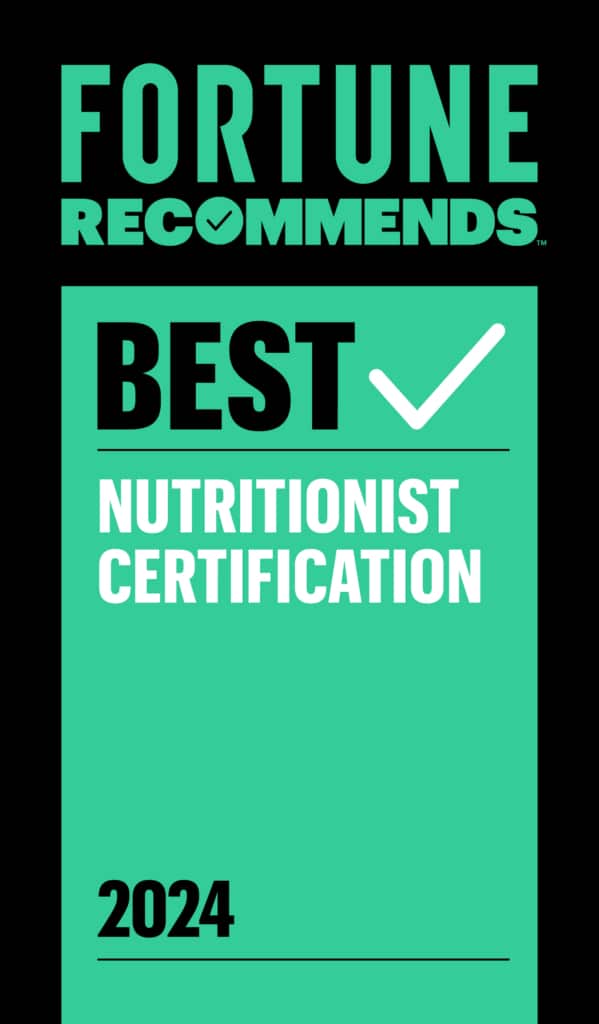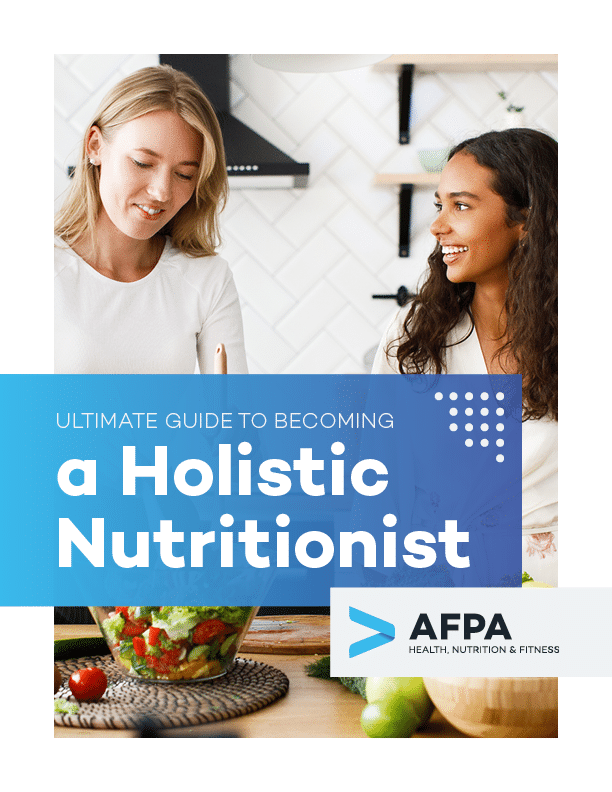Accredited Nutrition Certifications
Grow or build your career in nutrition, or expand your nutrition knowledge for personal gain with AFPA’s 100% online accredited nutrition certification courses. Whether your interest is in holistic nutrition, gut health, autoimmune nutrition, or sports nutrition, AFPA has a curriculum for you.
Proud to Be Recognized as the Best in Nutrition

Holistic Nutritionist Certification
ALSO SEEN IN THESE GREAT PUBLICATIONS

Explore Nutrition Coach Certifications
What You Will Learn
How to Teach Healthy Eating Habits
From weight management to peak fitness performance, support your clients with personalized nutrition education for their unique needs. Discover the most effective ways to teach your clients how to achieve a healthy lifestyle with research-based nutritional science.
Strategic Counseling and Goal Setting
Getting clients the results they’re looking for requires effective communication and proven goal-setting methods. You’ll learn the tried-and-true counseling approaches from practicing health coaches so the nutrition plans you assign are completed fully and client goals are achieved.
Dispel False Nutritional Beliefs
Discover our proven procedure for distinguishing what information is right and wrong. You’ll learn how to spot unreliable nutrition knowledge while educating clients on the correct way to approach dietary changes, no matter what age or demographic.
AFPA Nutrition Courses are For…

Aspiring Nutrition Professionals
Gain a foundation in holistic nutrition and specialize in serving niche populations as a nutrition coach. Our programs include food and nutrition science, as well as training on coaching and working with clients.

Holistic-Minded Registered Dietitian-Nutritionists (RDNs)
Look at the whole person and help individuals identify and address the root causes of chronic, long-standing health issues.

Personal Trainers & Health Coaches
Educate clients on nutrition science and help them reach their health and wellness goals. Dual certification is also a great way to increase your income potential.

Other Allied Healthcare Professionals
Deepen your understanding of how eating patterns affect overall wellness and better support your clients.

Individuals that Want to Improve Their Health
Do you want to take your health and eating habits into your own hands, or help a loved one live a more vibrant, healthy life? AFPA nutrition courses can be taken for personal benefit to help you optimize your wellbeing.
Key Benefits
Learn the Best Counseling Practices
Our accredited nutrition certification programs will show you the most effective way to counsel clients into making proper food and lifestyle choices. Implementing our counseling approach will give you the ability to guide others into making the right food changes supported by nutritional science.
Modular Nutrition Certifications
Each AFPA nutrition certification program has a modular design, giving you the ability to sign up for further knowledge in the specific nutritional field you want to learn more about. Our curriculum is structured to help you dive deeper into the subject you want to specialize in so you can give the best advice possible with no degree in nutrition required.
Valuable Business Resources
Once you’re certified, you can choose to be your own boss and start your own practice. We have the resources to help you start or grow your career in nutrition. If you decide on the entrepreneurial route, AFPA provides several business resources and guidance to help you establish a successful nutrition consulting business, as well as specialized credentials to increase your client base right away.
Our Accreditations
AFPA is recognized and fully meets the American Association of Drugless Practitioners (AADP) education requirements, providing students with the most comprehensive education to gain eligibility to also become a Board Certified Nutrition Professional.
Our Holistic Nutrition, Nutrition & Wellness Consultant and Masters Nutrition courses are all American Naturopathic Medical Accreditation Board (ANMAB) approved, which makes our graduates eligible to become board certified Holistic Health Care Practitioners through ANMAB.
AFPA is an approved CEU provider for NANP, NASM, AFAA and others. Completing one of our nutrition certification programs could earn you valuable CEUs to renew existing credentials with other organizations.
AFPA is a recognized coaching organizational member of the Association of Coach Training Organizations (ACTO).
AFPA is an International Institute of Complementary Therapists (IICT) Approved Training Provider for the modality Holistic Health Coach in Australia, NZ, South Africa and the UK/EU.
AFPA is an approved school with the Canadian Association for Integrative Nutrition. We’ve also received CEC Accreditation with CANFITPRO.
Nutrition Certifications FAQ
How are AFPA nutrition coach certification programs different than others? Answer
- Awarded the Best Nutrition Certification for 2024 by Fortune for affordability.
- Not a great test-taker? Don’t worry. 93% of AFPA graduates passed their final exam on the first try. We’ll prepare you for success.
- Fast-track your career with AFPA – most students complete their certification in just 4 months.
- AFPA students come back again and again and recommend us to their peers because they trust the quality of our curriculum and rely on our level of support.
- Become part of a global community – AFPA has graduates in over 140 countries.
- Benefit from 30+ years of experience in health, wellness, and fitness education.
- Flexible payment plans with financing as low as 0% APR help make your education possible.
- As an organization that cares about accessibility, we are often the low-cost choice. With AFPA, you can save on your education without sacrificing quality.
- Expand your expertise with 60+ continuing education courses.
What are the requirements to enroll in any of your nutrition certification programs? Answer
To qualify for any of our nutrition certification programs, you must:
- Be at least 18 years of age
- Have a solid understanding of the English language
For our Gut Health Nutrition Specialist program and Autoimmune Holistic Nutrition Certification, we also recommend (but do not require) that you:
- Hold at least one current certificate in a health, wellness, nutrition, or fitness discipline (OR) have an undergraduate degree in a health or science discipline
- Have knowledge of health and wellness coaching strategies and practices
A high school diploma or GED is not required to enroll in any AFPA nutrition program.
How soon can I start my nutrition certification course? Answer
We have open enrollment, so you may enroll whenever you are ready.
What happens after I enroll in my nutrition certification course? Answer
Shortly after you enroll, you will receive access to the online learning platform where you can begin your program whenever you are ready.
If your course includes digital textbooks:
If you complete an order during regular office hours (Monday-Friday 8 a.m.- 5 p.m. EST), we will process and issue your course digital textbook codes via email within 24 hours. If you complete your order outside of our regular office hours or on a federal holiday, please give us until the following business day to send your book codes.
How is the final exam administered for your nutrition courses? Answer
The final exam for each AFPA nutrition course is open-book and administered online.
If you don’t pass the final exam on your first attempt, you can request a re-test for an additional fee.
Can I complete one of your nutrition certification programs while working a full-time job or balancing family responsibilities? Answer
Many of our students complete the program while holding down full-time jobs or balancing other responsibilities, like being a stay-at-home parent. Our flexible programs allow you to move at your own pace over the course of 6 months and create a study plan that works with your unique schedule.
Once certified, some of our graduates chose to build a part-time nutrition business that allows them to also work another job, raise a family, etc.
Do you offer payment plans? Answer
Yes, AFPA offers flexible, interest-free payment plans without credit checks or added fees.
What is a Certified Holistic Nutritionist? Answer
A Certified Holistic Nutritionist is someone who can understand a client’s nutritional status and provide information about how a holistic nutrition approach can support them in strengthening all dimensions of wellness. The dimensions of wellness include physical, emotional, occupational, interpersonal, intellectual, spiritual, and cultural wellness.
Simply put, a Certified Holistic Nutritionist helps people implement nutritional strategies to make their lives better.
Certified Holistic Nutritionists are an integral part of the overall healthcare system; they offer supplemental care that helps fill in the gaps in traditional care.
While they cannot diagnose disease, they can meet someone where they’re at—whether someone has a disease, feels generally unwell, or is looking to add preventative measures—and help them make health behavior changes.
How do your Holistic Nutritionist Certification compare to the NASM Certified Nutrition Coach course? Answer
With our commitment to the highest quality holistic, evidence-based education, AFPA can equip you to maximize your impact. We set the gold standard by offering an affordable, convenient, interactive, and hands-on option on the path to becoming a holistic nutritionist or nutrition coach.
The AFPA Holistic Nutritionist Certification has over 400 5-star reviews and is a 100% online course that can be completed in less than 6 months from anywhere. Move through the course at your own pace within the online learning platform.
- Dynamic Learning Methodologies – Includes a variety of learning methodologies to support different types of learners
- Up-To-Date Curriculum – Features the latest research on nutrition, holistic health, and health behavior change
- Business Resources – Offers support for applying the knowledge and skills gained in the program in a professional setting
- Affordable Financial Investment – Costs less than the market value and is payable through a payment plan
- Flexible Course of Study – Can be completed online, from anywhere and at any time
What can you tell me about the Master Nutrition Consultant certification program? Answer
We have created a program guide specially directed at answering questions about our most comprehensive nutrition program yet. Check out the Master Level Nutrition Consultant Program Guide to see if this program is right for you.
How do I launch my career as a nutritionist? Answer
In our free guide, Ultimate Guide to Becoming a Holistic Nutritionist, you’ll learn how to turn your passion for health and nutrition into a profession with a holistic nutritionist certification.
Graduates of our nutritionist certification programs start a career by working with clients one-on-one, hosting group challenges, speaking, writing books and cookbooks, opening small businesses, and much more.
Is a certification in nutrition worth it? Answer
AFPA graduates overwhelmingly agree that their nutrition certification expanded their career opportunities and improved their personal wellbeing. However, the worth of a certification in nutrition depends on your goals, career path, and the specific certification you are considering. Here are some factors to consider:
- Career Goals: If you are looking to work as a registered dietitian, a certification in nutrition will not suffice. But if you want to work in the larger health and wellness field, or explore entrepreneurship, a certification may help you reach your goals.
- Knowledge and Skill Enhancement: For individuals looking to deepen their understanding of nutrition for personal use or to provide general advice to friends and family, a nutrition certification can be valuable. It can help you make healthier choices and understand the fundamentals of nutrition.
- Professional Advancement: If you’re already working in healthcare, fitness, or a related field, having a nutrition certification can enhance your qualifications and make you more competitive in your industry. It can open up opportunities for specialized roles or additional income streams.
- Credibility: Reputable certifications can lend credibility to your expertise and advice, which can be important if you are providing nutrition guidance to clients or the public.
- Licensing and Regulation: The requirements for practicing nutrition can vary by location. Some places may require specific certifications or licensure, while others have more lenient regulations. It’s essential to research the specific requirements in your area if you’re considering a career in nutrition.
- Investment: Certifications can vary widely in cost and time commitment. Consider the financial investment and whether the potential benefits, such as career advancement or personal knowledge, justify the expense.
How can I find clients as a certified nutrition professional? Answer
We have created this free guide, The Nutrition Consultant’s Guide to Finding and Winning Clients, for you to learn how to build a solid client base so that you can do the work you love. This guide covers everything from selecting the right client niche to creating a website that attracts clients.
What are the employment opportunities for a Certified Holistic Nutritionist? Answer
Holistic nutritionists usually work as consultants, either in an integrated clinic or as solo practitioners, and/or have their own independent business or online consultation business. They may also work in school or corporate settings. Some holistic nutritionists choose to specialize in areas such as holistic sports nutrition, home nutrition or family nutrition therapy. Other careers in holistic nutrition include research, teaching and working for a supplement manufacturer or whole foods company. Writing nutrition guides or working as a chef are other career possibilities.
How much does a nutrition professional earn? Answer
Nutritionists earned a median annual salary of nearly $62,000 in May 2021, according to the Bureau of Labor Statistics (BLS). Actual salaries may vary greatly based on specialization within the field, location, years of experience, and a variety of other factors. Your earning potential throughout your career will depend partially on variables like where you live, what services you provide, if you cater to a particular niche of clientele, and your area of expertise. In addition to these factors, your earning potential will also depend on your ability to work hard and to market yourself in your field, as well as your ability to network in your community and online. Consider building your base of clients with those who know and trust you enough to refer you to friends and family. Additionally, the nation’s health concerns and growing awareness of the importance of healthy eating will continue to boost earning potential for professionals in the nutrition field.
What’s the difference between a Certified Holistic Nutritionist and a Registered Dietitian? Answer
Certified Holistic Nutritionists provide clients with information about how a holistic nutrition approach can support them in strengthening all dimensions of wellness (physical, emotional, occupational, interpersonal, intellectual, spiritual, and cultural wellness).
Registered Dietitians are professionals who completed a four-year college degree with specific coursework in nutrition and passed the Registration Examination for Dietitians.
The word “nutritionist” is less regulated, and four-year college degrees are not necessarily required to use the term.
Learn more about the difference between a nutritionist and dietitian.
What’s the difference between a nutritionist and a health coach? Answer
Both health coaches and holistic nutritionists play essential roles in supporting individuals’ health and well-being, but there are notable differences in their focus and approaches.
A holistic nutritionist specializes in the field of holistic nutrition, which emphasizes the interconnection of various aspects of wellness, including physical, emotional, occupational, interpersonal, intellectual, spiritual, and cultural wellness. Holistic nutritionists primarily focus on the power of nutrition and its impact on overall health. They are trained in understanding the relationship between food, nutrients, and the human body. With their knowledge of holistic nutrition principles, they provide clients with personalized guidance and strategies to optimize their health and well-being through a balanced and wholesome diet.
On the other hand, a health coach takes a more comprehensive approach to wellness. While nutrition is an essential component of their work, health coaches often address a broader range of lifestyle factors that contribute to overall health. They consider aspects such as stress management, exercise, sleep, relationships, and personal development. Health coaches aim to empower individuals to make positive changes in various areas of their lives and support them in achieving their overall wellness goals.
While holistic nutritionists focus primarily on nutrition and its impact on health, health coaches use their coaching skills to address multiple dimensions of well-being. Ultimately, both professionals can make a positive impact on individuals’ health.
Read our full blog on the difference between a nutritionist and health coach.
Do you need a license to be a nutritionist? Answer
In the United States, nutrition practice laws vary by state. Depending on the degree or nutritionist certification you have obtained, the type of practice you can open and the type of advice you can give change based on where you live.
State laws on nutrition are broken up into different types:
- None
- Certification
- Title Protection
- Licensure with a defined scope of practice
None/Certification States without laws regarding the practice of nutrition are the easiest, of course, but they are few. Some states have a certification law that provides for state recognition and certification of specific individuals who meet a set of defined criteria, such as a private certification, education, etc. This certification does not prevent anyone else from practicing nutrition, but it may protect certain titles, such as “dietitian” or “nutritionist,” and abbreviations, such as “RD” or “CD.”
Title protection laws are the next level of restriction because they start to incorporate the basic tenants of licensure. While some states do not restrict the practice of nutrition, they may place strict limitations on who may use certain titles and require a license to do so. A title protection law may or may not contain a scope of practice, but if so, that scope will not be defined exclusively to one group. For example, Texas has a licensure option for those who wish to use the protected titles “licensed dietitian” or “registered dietitian.” Other examples are North Carolina and New Jersey, which have a licensure requirement to practice dietetics, but these laws also have very broad exemptions for those who are non-licensed.
The main elements of a licensure law with a defined scope of practice is are that the state REQUIRES a person to have very specific education and other criteria to be granted a license. This license gives its holder an exclusive right to practice within a defined scope of practice. These laws tend to have very narrow exemptions and can be quite broad in their application. The requirements to become licensed, and thus take advantage of the exclusive privileges of licensure, are almost always limited for just Registered Dietitians. For example, the state of Ohio specifically defines what the “Practice of dietetics” means within the law, and then it reserves that exclusively for those with a license: “…no person shall practice, offer to practice, or hold himself forth to practice dietetics unless he has been licensed…”
Exemptions:
Most restrictive states contain some standard exemptions within the law. These exemptions generally allow for persons to practice nutrition and dietetics if they are employed by one or more of the following:
- Federal, state, county or municipal agency
- Military
- Another political subdivision
- Elementary or secondary school
- Accredited institution of higher education
The Council of Holistic Health Educators has compiled a comprehensive list of current nutrition practice laws by state.
Are there any restrictions in my state regarding what I can do as a certified holistic nutrition professional? Answer
The laws around certified wellness practitioners can be confusing, especially because they differ from state to state. Check out this guide to help you better understand those laws, the different types, and how they impact your ability to practice. To learn more about the laws impacting you, browse by state here.
What is medical nutrition therapy? Answer
Medical Nutrition Therapy (MNT) is a specialized form of nutritional treatment and counseling provided by registered dietitians to individuals with specific medical conditions, illnesses, or dietary needs. MNT is out of scope for practicing holistic nutritionists or nutrition coaches.

PROGRAM GUIDE
Ultimate Guide to Becoming a Holistic Nutritionist
The demand for nutritional professionals is growing as people increasingly prioritize health. Download our official Certified Holistic Nutritionist Program Guide to learn more about pursuing a fulfilling career as a nutritionist.






